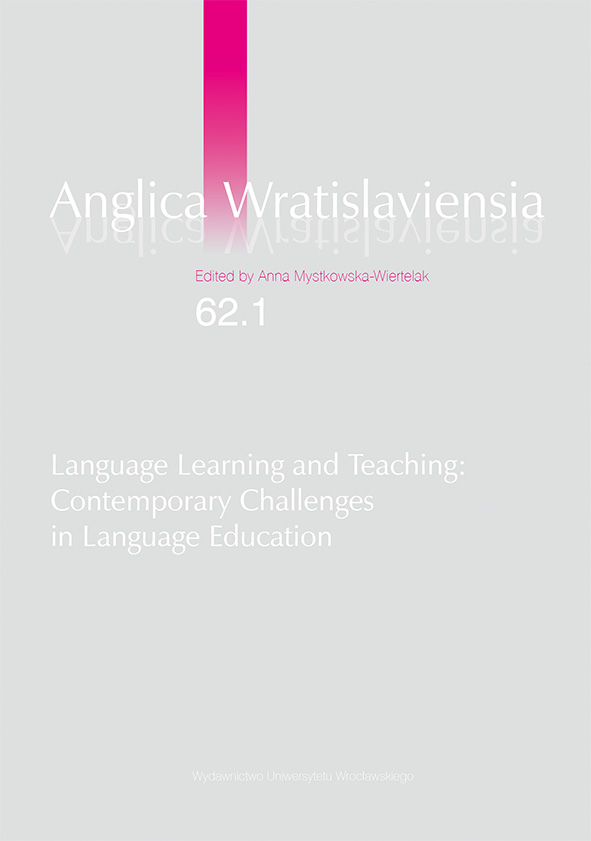

Artykuły

This paper is devoted to the discussion of a specific crisis situation that had a considerable impact on the professional lives of many teachers in Poland, namely the appearance of war refugee students from Ukraine in Polish schools after 24 February 2022, that is, after the Russian invasion on Ukraine and the subsequent influx of refugees from Ukraine to Poland. The aim of the study was to gain insight into the experiences of Polish teachers of English as a foreign language (EFL) in the context of this situation. The general picture emerging from the study is that the respondents, who teach refugee students, make an effort to create a friendly and safe learning environment for them. As far as the language of communication is concerned, it is especially early- and late-career teachers who made an effort to learn the language(s) of their students: many early-career teachers learn Ukrainian or Russian, and many late-career teachers are motivated to brush up on their Russian to communicate with their students. Most of the respondents show interest in participating in professional training to gain knowledge and skills in working with refugee students, although such training was only available to a small group of study participants. The study also asked the respondents if certain activities, such as adjusting the teaching content to the level of the students or talking to Ukrainian students about their feelings about being in a new environment, were problematic or difficult for them. Most of the respondents did not report any major problems in this regard.
Central Statistical Office. 2023. “Oświata i wychowanie w roku szkolnym 2022/2023.” Retrieved from https://stat.gov.pl/obszarytematyczne/edukacja/edukacja/oswiata-i-wychowanie-w-roku-szkolnym-20222023,1,18.html. 1 July 2023.
—. 2013. “Informacja o rozmiarach i kierunkach emigracji z Polski w Latach 2004–2012.” Retrieved from https://stat.gov.pl/cps/rde/xbcr/gus/L_Szacunek_emigracji_z_Polski_lata_2004-2012_XI_2012.pdf. 1 June 2023.
Day, C. and Q. Gu. 2010. The New Lives of Teachers. Abingdon: Routledge.
Długosz, Z. and S. Biały. 2014. “Selected Aspects of Permanent Emigration from Poland (2001–2010).” Bulletin of Geography. Socio-Economic Series 23. 25–37.
Figarski, W. 2008. “Język Rosyjski w Polsce—fakty i mity.” Przegląd Rusycystyczny 1.121. 84–97. Jędryka, B. K. 2022. “Dobry start uczniów z doświadczeniem migracji.” Języki Obce w Szkole 2. 29–46.
Kościółek, J. 2020. “Children with Migration Backgrounds in Polish Schools—Problems and Challenges.” Annales, Series Historia et Sociologia 30.4. 601–12.
Mercer, S. 2023. “Psychological Perspectives: Beyond the Individual.” A paper presented at the 34th International Conference on Foreign/Second Language Acquisition, Szczyrk, 18 May 2023.
Nosidlak, K. 2023. “Stories of Successful Adaptations of Immigrant Students in the Polish Educational System—Perspective of EFL teachers.” Neofilolog 60.2. 440–56.
Rokita-Jaśkow, J. 2022. “Uczeń z doświadczeniem migracji na lekcji języka angielskiego: wyzwania i rozwiązania.” Neofilolog 58.2. 193–208.
Sterniński, R. 2019. “Economic Migrations to Poland in 2008–2018.” Zeszyty Naukowe Małopolskiej Wyższej Szkoły Ekonomicznej w Tarnowie 43.3. 59–71.
Szaban, D. 2022. “Challenges for Polish Educational Policy Related to the Influx of Students from Ukraine.” Przegląd Narodowościowy 12. 173–183.
Straż Graniczna. 2022, September 22. “Od 24.02 #funkcjonariuszeSG odprawili w przejściach granicznych...”. Retrieved from https://twitter.com/Straz_Graniczna/status/1575365781818408960. 10 June 2023.
Szybura, A. 2016. “Nauczanie języka polskiego dzieci imigrantów, migrantów i reemigrantów.” Języki Obce w Szkole 1. 112–117.